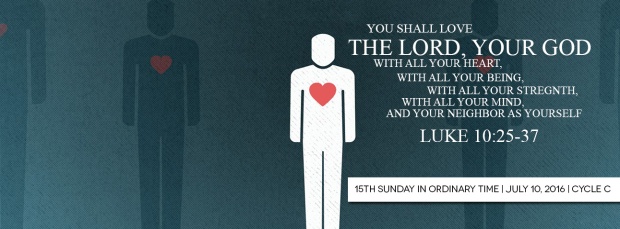
Graphics by Asp. Paul Lopez, Don Bosco Seminary
Elementary English has taught us that love, together with justice and peace is an abstract noun. It’s not something tangible. It cannot be felt by our skin, nor seen by our eyes. It is neither sniffed by our nose, more so, it doesn’t appeal to our palate.
But our liturgy today points out otherwise. Love is concrete. And it is tangibly seen in the way we treat other people, especially those who do not belong to our circle of friends and acquaintances, people who are slightly different, individuals whom we don’t exactly hate, but we also don’t like much.
Indeed, our readings today strike at the core of our radicality as Christ’s followers.
Following our Lord Jesus’ example, our liturgy is instructive that by calling ourselves Christians, we belong to a religion which is not just into mere abstraction. It demands from us concrete actions as Christians. It calls us to task to more or less behave how Christ behaved–He did it with much accompaniment, tenderness, and inclusivity!
In the first reading, Moses tells us that God’s law is not something remote, nor mysterious. It’s within our reach.
In fact, before God’s commandments were carved on the stone, they’re first inscribed in our very hearts. That perhaps explains why there are certain truths which are fundamentally the same from one culture to another: in the world over, life is constantly valued–while murder is frowned upon.
Hence, we neither need any religion, nor school, nor the police to point out to us that killing someone is a terrible crime. Deep within us, we know that that truth exists. Our catechism points out thus: We have a conscience—that “voice, [which] tells us to do what is good and to avoid that is evil” (CCC, 1776).
This law has reached its fullness in Jesus. That’s what St. Paul in the second reading tells us. Jesus has revealed to us what the invisible Father looks like. Pope Francis speaks of the same in a letter he wrote last year, pointing out that Jesus is the face of the Father’s mercy.
It is in Jesus that the Father has revealed everything, and it is through Him that the Father has reconciled all things in the earth and even in Heaven. Jesus now becomes the criterion of our action; He is our standard.
The story of the Good Samaritan in our Gospel is not just some nice story pleasant to our ears. It asks us to imitate what the Good Samaritan did–it commands us to do the same!
Samaritans and Jews have a long story of conflict. They may not openly declare war against each other, but there is a cold shoulder treatment between them. And so, one does not want to be in company of the other. The story goes on that a man who was robbed, and deeply beaten was just left by the road. Luke describes him to be half-dead. Two Jewish figures passed by, and not wanting to be disturbed, because the man was covered with blood, they had to take the opposite side.
The third figure showed us how God could love with so much tenderness and inclusivity. He is a Samaritan, much despised of by the Jews. And yet, he did not just stop by to look into the hapless man. He was “moved with compassion at the sight.” This is the real, authentic, genuine form of compassion—that which makes someone spring into action, to rush to another to offer help.
Luke was keen in reporting the details of what the Samaritan did, “He approached the victim, poured oil and wine over his wounds and bandaged them. Then he lifted him up on his own animal, took him to an inn, and cared for him.
The next day he took out two silver coins and gave them to the innkeeper the instruction, “Take care of him. If you spend more than what I have given you, I shall repay you on my way back.’ Which of these three, in your opinion, was neighbor to the robbers’ victim?”
A person considered their enemy showed the very mercy which is God’s essence. Here’s a beautiful lesson, a strong argument for us to stop stereotyping people. it challenges us to see each human person as a neighbor to love.
Yesterday, I heard a beautiful story of a couple who lost their child in a vehicular accident.
Apparently, the driver who ran over their child was on the cellphone.
When they met him for the mediation, the woman confronted the driver, and asked him why ever since the accident happened, she had not heard him apologized to them for taking away their child. The driver said, he wanted to. But he didn’t since the couple might just shrug it off since his apologies would not be able to bring back their child.
Out of nowhere, the mother suddenly just heard herself saying, “Why don’t you try?” The driver, went through the motions in issuing the demanded apologies. The mother just found her hand extending itself to the driver, offering to him her forgiveness. The man burst into tears—all his emotions poured out. The same thing happened to the woman. The other sought and found forgiveness, and the other with God’s grace, was able to grant the forgiveness sought for. Both of them were set free in an instant.
Let this Eucharist nourish in us the love for our neighbor. Let this Eucharist allow us to love without limits, tender with our love for them. In doing so, we are able to live up to our being Christians.